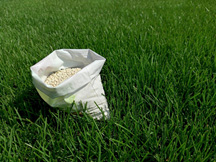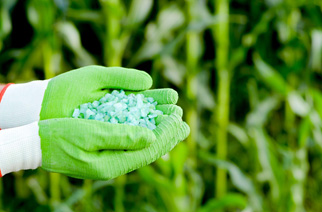Are you thinking about getting lawn care for your Massachusetts turf? We know that the options to choose from can be overwhelming. To simplify things, we want to break down the two lawn fertilization types you’ll run into: organic and conventional.
While all lawn fertilizers focus on the three essential NPK macronutrients (nitrogen, phosphorous, and potassium), not all fertilizers are created equal. Both conventional and organic lawn fertilizers have pros and cons that you should consider before making a critical lawn care decision. So before you call up your local Massachusetts lawn care team, check out these top six differences between organic and conventional fertilizers.

1. Organic fertilizers are made of organic material, while conventional fertilizers are made of inorganic material.
Organic lawn fertilizers are composed of several organic compounds, while conventional fertilizers consist of concentrated nutrients created from manufacturing. Organic fertilizers can be made from various components, including animal manure, bone, fish meal, shells, compost, peat, and more. All these contain at least one of the macronutrients, but combined, they make a rich fertilizer blend.
While conventional fertilizers are technically made from natural raw materials like gasses and ores, they’re processed to be a beneficial combination of macronutrients. In addition, conventional fertilizers are synthetic because they’re composed of human-crafted, inorganic compounds. While they work very differently underground, both fertilizer types are crafted to improve the health and strength of your lawn.

2. Organic fertilizers release slower than conventional fertilizers.
Because organic fertilizers are made up of natural, fibrous, and rigid products like plant matter, it can take microbes a long time to break them down. This aspect means that the nutrients seep into the soil much slower. A slow release of nutrients is often favorable because slow-release fertilizers are safer for your lawn. When not correctly applied, the concentrated nutrients in conventional fertilizers are harsh on plant tissue and can cause yellow patches in your turf. However, organic fertilizers avoid this problem altogether, but you have to use more to get the same results as conventional fertilizers.
Hiring a local lawn care team to carry out conventional fertilizer applications can also avoid fertilizer burn. Lawn care professionals understand which climates are best for fertilizer applications to protect your grass. They can also recommend effective and safe slow-release fertilizers that steadily feed your lawn nutrients. Plus, you’ll save yourself time and anxiety surrounding fertilizer application.

3. Conventional fertilizers help the grass grow faster than organic fertilizers.
Conventional fertilizers are the best choice for a quick fix if your grass needs some quick TLC. First, they have a shorter breakdown time than organic fertilizers, meaning your lawn can use its nutrients more efficiently. This rapid breakdown time can be beneficial in emergencies when you have weak or sick grass that needs an immediate boost.
In addition, because conventional fertilizers result in a quicker growth rate than organic lawn fertilizers, it can be much easier to make your lawn a beautiful, vibrant green in no time. While organic fertilizing takes planning and weeks to see results, you can see results from conventional fertilizers within a week. So, if you’re having a backyard barbeque or need to boost your lawn’s health quickly, conventional fertilizers are the way to go.

4. Organic fertilizers feed beneficial soil microorganisms.
Organic fertilizers are packed full of natural nutrients. When microbes break them down, those nutrients are slowly released into the soil, making it dense with various minerals. Plus, the microbes that decompose the organic fertilizer also reap its benefit. Since materials like plant and animal matter act as food for microbes, organic fertilizers also increase the diversity and density of microbes in the soil. This way, nutrients are cycled efficiently for your lawn.
While conventional fertilizers don’t necessarily feed beneficial microbes, there are other ways to maintain a healthy microbe population in conventional lawn care. For example, deep watering creates a more habitable environment for soil microbes. In addition, adding lime to the soil neutralizes its pH, so it’s less acidic and encourages more microbial activity.

5. Conventional fertilizers are more accessible than organic fertilizers.
One of the primary reasons most homeowners gravitate to conventional fertilizers is their accessibility. Conventional fertilizers are on the shelves of almost every home and garden store. Plus, nearly all lawn care companies provide traditional lawn fertilizer services. It’s easy to grab a bag and run out the door within minutes so that you can do the job within a day. However, compared to buying conventional fertilizers, you might have to jump from store to store to find an organic fertilizer that fits the needs of your lawn.
In addition to being physically accessible, they’re less expensive than organic fertilizers. With organic lawn fertilizers going for $40 for 16 lbs on Amazon, it’s no wonder why yard owners are sticking with conventional methods. While you can argue that organic fertilizer can reduce the costs of maintaining your turf’s soil in the long run, the upfront cost is much more than conventional fertilizer.

6. Conventional fertilizers provide an even release of nutrients.
While organic fertilizers are nutrient-dense, conventional fertilizers are always designed to have a balanced ratio of NPK nutrients. In addition, they’re purposely made to equally distribute the nutrients in water-soluble granules, making them faster-acting and easier to disperse evenly. Then, with a deep watering after the application, the fertilizer goes to work seeping into the soil and feeding your grass.
Organic fertilizers release nutrients steadily. However, many organic fertilizers don’t have an exact nutrient ratio since organic material can vary in nutrient levels. This means that nutrients might be distributed unevenly throughout the soil. You can combat uneven distribution by ensuring that your organic fertilizer is well-mixed and easily digestible, so your plants can efficiently absorb the nutrients it needs.

Whether organic or conventional fertilizer is better for your home is up to you.
If you’re on the fence about which type of fertilizer to get for your lawn, we’re here to help. Our team at Barefoot Lawns offers conventional and organic lawn care to Massachusetts residents. So, shoot your questions our way, and we’ll be happy to assist! Don’t hesitate to reach us at (508) 281-1441 or contact us here to get information on our fertilizer services today.


Recent Comments